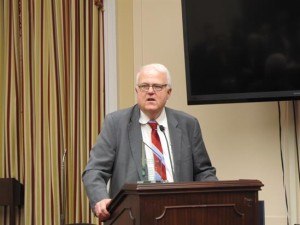President Barack Obama’s drive to get one last legacy-enhancing act out of Congress — revamping sentences for street-level drug crimes — is hitting an impasse over crimes committed in corporate suites.
The White House has mounted an unusual effort to maintain momentum on the issue, which the president will highlight with Tuesday’s State of the Union address. That’s included a personal appeal by Obama to lawmakers haggling over the legislation and a private meeting between one of his closest advisers and a representative of billionaire Republican donors Charles and David Koch.
Obama wants to make a criminal justice overhaul a cornerstone of his final year in office by cutting mandatory minimum sentences for non-violent drug offenders and giving judges greater discretion in setting prison terms. To do so, he’s cobbled together an unlikely alliance that includes the Koch brothers, libertarian-leaning lawmakers like 2016 presidential candidate Rand Paul and some liberal Democrats.
But that bipartisan coalition is running up against influential Republicans who are pressing colleagues to include a requirement to force federal prosecutors prove that certain criminal defendants specifically intended to act in a way they could reasonably be expected to know would be illegal. The change would mostly affect crimes involving corporations and businesses, as prosecutors already must prove that defendants intended to commit common-law crimes such as murder, assault or robbery.
‘Guilty Mind’
Lawyers call this element of proof “mens rea,” the Latin phrase for “guilty knowledge” or “guilty mind.”
The Obama administration argues that a blanket expansion of a requirement to prove intent for violating federal regulations to prevent pollution, consumer fraud or the sale of unsafe food or medicines would immunize corporate executives from criminal prosecution over wrongdoing committed by the companies they run.
 The attempt to graft the mens rea issue onto a criminal justice bill could kill the entire package.
The attempt to graft the mens rea issue onto a criminal justice bill could kill the entire package.
During a December meeting with a bipartisan group of lawmakers at the White House, Obama argued in favor of a compromise bill negotiated in the Senate last fall.
Inventory of Laws
That proposal requires the Justice Department to compile an inventory of federal regulatory crimes, whether criminal intent is an element of proof, as well as the number of convictions prosecutors obtained in the last 15 years and the average sentence imposed for each offense during the period. The provision may satisfy Republicans looking to lay the groundwork for a future revamp of the criminal code.
“The president walked through his concern about the unintended consequences,” Valerie Jarrett, the president’s senior adviser, said in an interview.
But the compromise is being threatened by Republicans Senator Orrin Hatch of Utah and Representative Jim Sensenbrenner of Wisconsin, both former chairmen of their chamber’s Judiciary Committee.
Broader Changes
They are pushing a broader change to the federal criminal codes by arguing that scores of federal laws don’t include specific language about criminal intent, therefore individuals can’t be reasonably expected to know if their actions, particularly those running afoul of regulatory rules, violate the law.

Sensenbrenner, chairman of the Judiciary panel’s crime subcommittee, said in an interview that the business community views mens rea as essential and leaving it out of the legislation would be a deal breaker. Some key House Democrats, including members of the Congressional Black Caucus, are backing the broader changes in hopes of achieving a deal that would earn enough Republican support.
“I don’t think sentence reform can pass if it is not part of a package,” Sensenbrenner said. “If we split this up, you’ll probably see most Republicans being opposed to any kind of change in sentencing procedure.”
The hang up may have prompted a meeting in December between Jarrett and Mark Holden, the general counsel at Koch Industries. While the Koch brothers have been supportive of Obama’s criminal justice agenda, they have also advocated for the mens rea provision — which critics say could shield executives in their vast energy and manufacturing businesses.
Opposition Dropped
But after the meeting with Jarrett, Holden announced the Kochs could support legislation that didn’t include the changes. The reason, he said, was that they favored as much of a comprehensive criminal justice overhaul “as Congress and the president have the appetite for.”
“The Senate bill, the Sentencing Reform and Corrections Act, doesn’t have anything on mens rea reform. We’re comfortable with that,” Holden said in an interview.” The House bill has it. We’re comfortable with that as well. But our point is we want something to pass.”
Despite the influence wielded by the Kochs, who have said they plan to spend around $750 million in the 2016 election cycle, the move appears to have done little to sway House Republicans, with Sensenbrenner accusing Obama of throwing “a monkey wrench” into negotiations.
Prosecuting Cases
Administration officials cited prosecutions that would have been affected by requiring criminal intent. The owner and a top executive of Quality Egg LLC, an Iowa egg manufacturer, received jail time for their role in a salmonella outbreak that was linked to nearly 2,000 consumer illnesses. In another case, the owner of Texas-based pharmaceutical company ApotheCure Inc., pleaded guilty to two misdemeanor criminal charges after his company shipped misbranded pain relievers that led to the overdose deaths of three people.
Sensenbrenner said federal laws already carry a “strict liability” standard of guilt that Congress has spelled out in the legislation. His legislation “does not change that,” he said, while dismissing the administration’s arguments as a “red herring.”
In the Senate, Hatch has said he won’t support a sentencing overhaul without the mens rea provision. As former chairman of the Judiciary Committee, he could use his influence to pressure Republican bill managers to include it as a floor amendment.
No Timetable
In addition to the mens rea issue, the House is still trying to line up the package of other bills to include with the sentencing changes, according to House Republican Whip Steve Scalise of Louisiana. Neither chamber has set a timetable for when the bills would come up. There are continued discussions about finding common ground on the mens rea issue, John Conyers of Michigan, the top Democrat on the House Judiciary Committee said.
Obama will try to goad progress in his State of the Union address. Among the guests in the first lady’s box will be Sue Ellen Allen, a former inmate who founded an Arizona nonprofit to assist other criminals reentering society. The White House “has worked hard to try to nurture” progress on the legislation and sees it among its top legislative goals, press secretary Josh Earnest told reporters on Monday.
Holden said he is optimistic that there would be legislation sent to the president “in the first quarter, or by Easter.”
“There’s definitely a lot of optimism, at least from our perspective on it,” he said. “As I like to say, there’s no good reason for it not to happen.”
Obama has received “strong indications” from Congress that criminal justice legislation is a top priority, Jarrett added.
“This is a top priority for him going forward and we think given the momentum moving forward in the next couple of months is possible,” she said.





















 Lessons From 25 Years Leading Accident & Health at Crum & Forster
Lessons From 25 Years Leading Accident & Health at Crum & Forster  Insurance Groundhogs Warming Up to Market Changes
Insurance Groundhogs Warming Up to Market Changes  Experts Say It’s Difficult to Tie AI to Layoffs
Experts Say It’s Difficult to Tie AI to Layoffs  How Americans Are Using AI at Work: Gallup Poll
How Americans Are Using AI at Work: Gallup Poll 